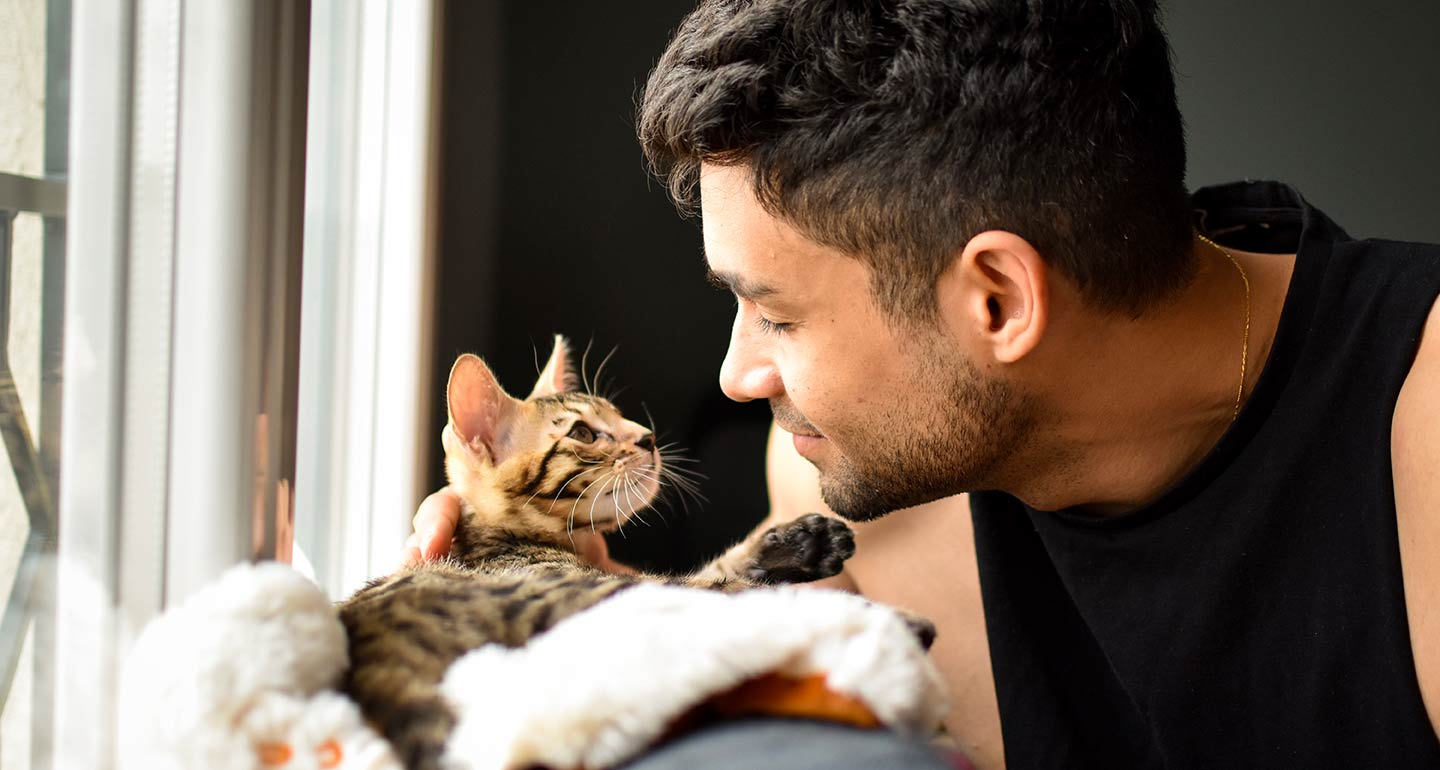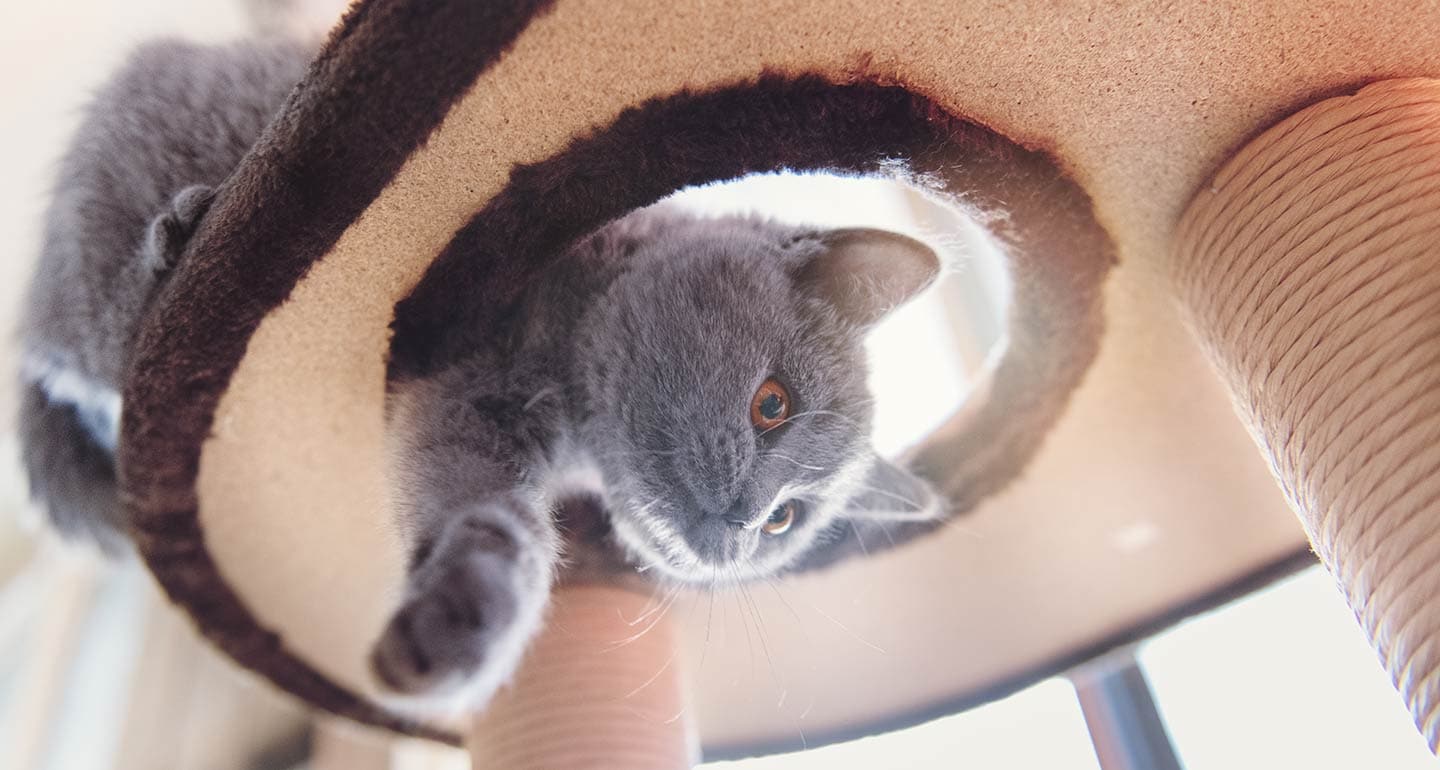Let’s be clear: You love your cat. That sassy little furball is the light of your life. But lately, you’ve been wondering if there’s room for another kitty in your heart. Maybe you think your cat needs a friend. Maybe you’ve fallen in love with your neighbor’s foster feline. Whatever the reason, you’re finding yourself wondering, “Should I get another cat?”
The prospect of growing your animal family can be exciting. But before you make any permanent decisions, remember that adding another cat to your crew is no small task. Caring for a new pet is a big responsibility, even for an experienced cat parent like yourself.
So how do you know if you’re ready? Answer these five questions to determine whether you should get another cat—or if you’d be better off just loving the one you’re with.

1 Will My Cat Accept Another Cat?
Imagine yourself sitting comfortably in your home, minding your own business, when in walks a complete stranger. He introduces himself as your new roommate—one you didn’t agree to—and starts moving into your coveted living space.
How would you feel?
Well, if you’re friendly to newcomers and this new roommate seems nice, you might not mind so much. But if you were happy with your home as it was and don’t love meeting strangers? Look out, new guy. The same is true with cats.
“When you are considering getting another cat, you really must consider the needs of the resident pet,” says Dr. Amanda Rigterink, DVM, DACVB, a board-certified veterinary behaviorist with Veterinary Behavior of Indiana in Carmel . “Certain cats have certain personalities. Some prefer to be alone and some are quite social.”
Domesticated cats originated thousands of years ago from the African Wildcat, a solitary hunting animal, Dr. Rigterink says. Through domestication, cats have evolved and socialized, but for some, those ancient instincts remain. If your cat has reacted aggressively toward other animals or people in the past, those instincts could be the reason why—and they may react similarly should you get another cat.
That’s not to say that all cats are destined to be loners. Research has shown that cats who are littermates or otherwise related to each other have an easier time getting along, Dr. Rigterink says.
On the flip side, an age difference can work against you. “When you have an adult cat, who may not be as playful, and you introduce a young kitten, you have to be very careful,” Dr. Rigterink says. “You need to make sure you’re giving the younger kitten plenty of opportunities for playing. And the key, with any introduction, is ensuring they each have their own space.”

2 I Have the Time and Space for Another Cat?
There’s a lot more to introducing cats than simply bringing a new cat home. It can be a long and sensitive process of acclimating each cat to the other—and you should get another cat only if you’re prepared to do the work.
“Any time you’re introducing any pet into a household, you have to be patient and know that there will be a period needed for adjustments,” says Brian C. Hurley, DVM, the national medical director of AmeriVet Veterinary Partners Inc. and co-owner of Gardner Animal Care Center in Gardner, Massachusetts. “Never leave them unsupervised initially and be ready to dedicate whatever amount of time is necessary.”
So, how much time and space are we talking about here? When it comes to space, there’s no set amount that works for all cats, Dr. Rigterink says. In general, each cat will need their own safe place, aka an area the other cat can’t enter. They’ll also need safe pathways to get to their food and water bowls and litter boxes.
“If you have two cats, ideally you’ll have three litter boxes, which should be spaced around the house,” she says. “That way, when the cats come together, there is no immediate notion of bullying or stalking.”
There are no guarantees for the amount of time it can take to successfully introduce your cats either, Dr. Rigterink says. Some cats buddy up relatively quickly; others may never truly enjoy their new roommate’s company. The safest bet is to be prepared for a lengthy process. “Sometimes it can take a few weeks or few months for cats to truly get comfortable with one another,” she says.
Read more about how to introduce cats.
Even after your cats get used to each other, they’ll still need multiple litter boxes and their own beds and perches—all of which takes up space. You should be ready to dedicate some of your home’s square footage for years to come. A new cat will also need enrichment activities, aka playtime with you. Remember: If your cats don’t enjoy playing together, you’ll be devoting twice as much time to swinging feather wands and tossing catnip mice.

3 Can I Afford Another Cat?
Remember all the stuff you had to buy when you brought your first cat home? Get ready to do it all over again with a new cat. They’ll need more toys, their own comfy bed, additional litter boxes, vet appointments and more.
“There really are so many other things to consider,” Dr. Rigterink says, adding treats, scratching posts, wellness visits to the vet and vaccines to the list. “These are all important to keep in mind when getting a new cat.”
A new cat costs, on average, $1,174 in their first year according to the American Society for the Prevention of Cruelty to Animals (ASPCA). This figure encompasses food, litter, toys, spaying/neutering, pet insurance and initial medical costs.
“Vet costs can be a surprise for dog and cat owners alike,” Dr. Rigterink says. You should only get another cat if you’re prepared for the unexpected. If you’re not able to afford the full cost of last-minute emergency expenses, she adds, “There are plenty of pet insurance options that have emerged to help manage those costs.”
For a full list of the supplies you’ll need, check out our New Cat Checklist.

4 Is My Home Ready for Another Cat?
You already have a cat, so you know that they’re extremely talented at getting into mischief. That means you’ll need to be ready to take some cat-proofing precautions to keep your new feline friend safe—and yes, that’s true even for homes where a cat already lives.
Every cat is different, Dr. Rigterink says, so even if your current pets safely avoid any potential hazards in your home, that’s no guarantee that a new cat will. Among the most common home safety concerns are electrical and computer cords, which can trap or even electrocute cats who play or bite them. Esnure they are properly covered, or restrict your cat’s access to them.
Also, remember to remove any potentially hazardous plants. There are more than 100 species of plants that are toxic to cats, including common varieties like lilies, azaleas and laurels.
In addition to certain home features, you’ll want to be cognizant of your guests—especially any feline ones. “It’s very important that there are no outside cat visitors while your cats adjust to each other,” Dr. Rigterink says. “That can disrupt the harmony you’ve worked hard to create.”

5 Is My Family Ready for Another Cat?
Unless you live alone, getting a new pet is a group decision. Even if you plan to do all the work of caring for a new cat, your family members or roommates will still have to share their space with this creature, Dr. Rigterink says. So no, you should not get another cat against the wishes of someone you live with, and think long and hard before bringing home a pet as a surprise or as a gift.
It’s also important that everyone in your household knows their responsibilities when it comes to taking care of a new cat. “With my job as a pet behaviorist, I make sure everyone is in agreement with a customized plan,” Dr. Rigterink says. “This plan can span monitoring a cat’s body language, ensuring the litter box is scooped and changed, having the water bowls filled and more.”
So, should you get a new cat? If you’ve answered no to any of the above questions, the best course of action may be to stick to a one-cat home. But if you’ve got the resources, the family/roommate support and, perhaps most importantly, the patience to manage two cats through their introductions and beyond, the odds are in your favor.
“Most of the time, in spite of what we choose to do, our cats are quite resilient,” Dr. Hurley says. “But it’s important for us to do our part.”
Share:










